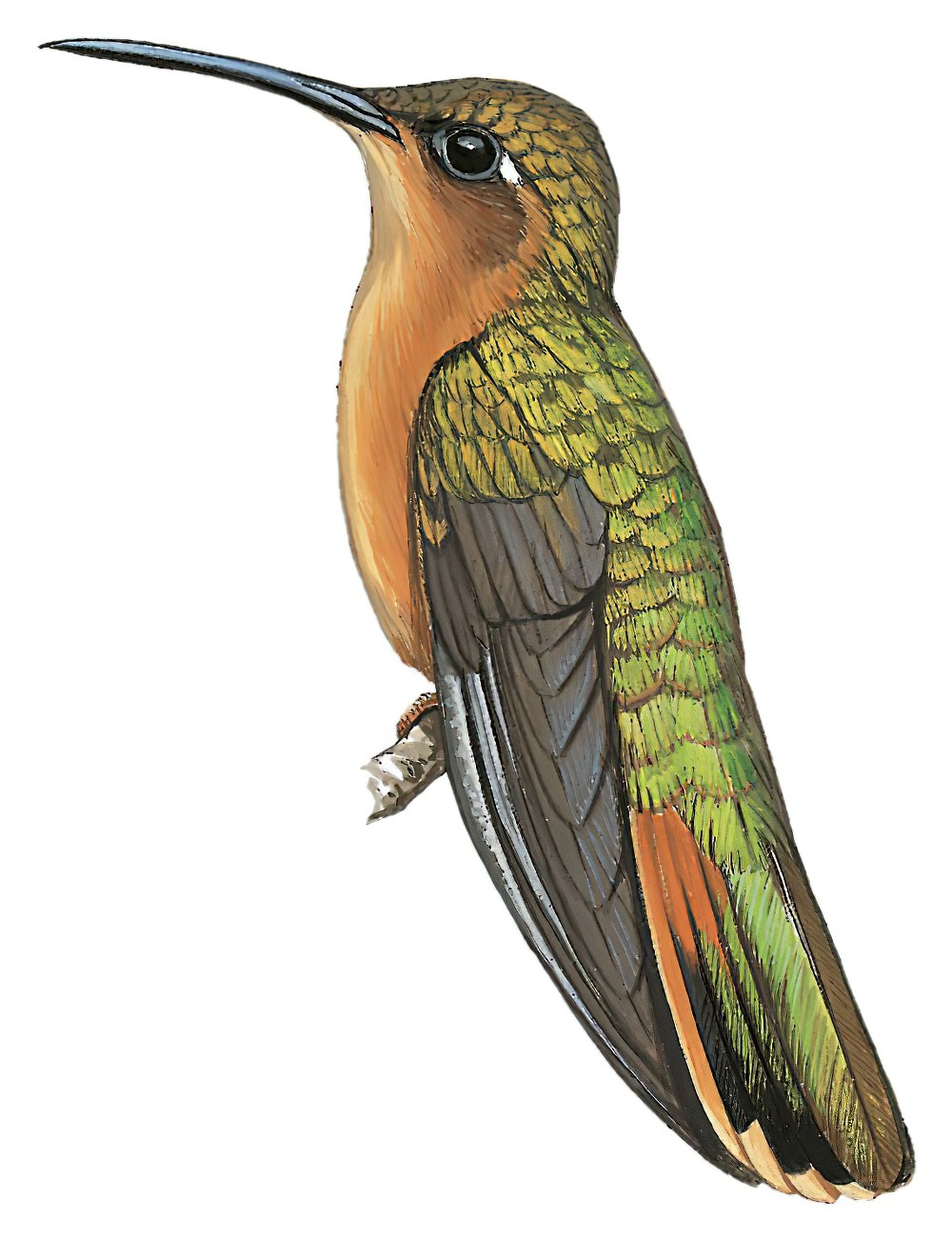Rufous Sabrewing / Campylopterus rufus

Rufous Sabrewing
SCI Name:
Protonym: Campylopterus rufus Rev.Zool. 3 p.73
Taxonomy: Caprimulgiformes / Trochilidae / Campylopterus
Taxonomy Code: rufsab1
Type Locality: No locality, « Guatemala.
Author: Lesson
Publish Year: 1840
IUCN Status: Least Concern
DEFINITIONS
CAMPYLOPTERUS
(Trochilidae; Ϯ Grey-breasted Sabrewing C. largipennis) Gr. καμπυλος kampulos curved, bent < καμπτω kamptō to bend; -πτερος -pteros
-winged < πτερον pteron wing (cf. specific name Trochilus campylopterus J. Gmelin, 1788 (= syn. Campylopterus largipennis)); "CAMPYLOPTERUS. Rostrum longiusculum, sub-arcuatum. Alæ falcatæ; remigum primarum scapis dilatato-compressis. Cauda rotundata, vel gradata. Types. 1. T. latipennis. 2. falcatus. Sw., Zool. Ill. ... Wings falcated, the shafts or scapes of the primary quills dilated and compressed." (Swainson 1827); "Campylopterus Swainson, Zool. Journ., 3, 1827, p. 358. Type, by subsequent designation, C. latipennis (Lath.) = Trochilus largipennis Boddaert. (G. R. Gray, List Gen. Bds., 1840, p. 13.)" (Peters, 1945, V, p. 18).
Var. Campilopterus.
Synon. Bombornis, Loxopterus, Pampa, Phaeochroa, Platystylopterus, Saepiopterus, Sphenoproctus.
campylopterus
Gr. καμπυλος kampulos curved, bent < καμπτω kamptō to bend; -πτερος -pteros -winged < πτερον pteron wing.
● ex “Oiseau-mouche à larges tuyaux de Cayenne” of d’Aubenon 1765-1781, pl. 672, fig. 2, “Oiseau-mouche à larges tuyaux” of de Buffon 1770-1783, and “Broad-shafted Humming-bird” of Latham 1783 (syn. Campylopterus largipennis).
rufum / rufus
L. rufus red, ruddy, rufous. In ornithology rufus, rufa and rufum cover a wide spectrum of colours from yellow, orange and brown to crimson, scarlet and purple.
● ex “Red-legg’d Partridge from Barbary” of Edwards 1743-1751 (syn. Alectoris rufa).
● ex “Crapaud-Volant” or “Tête-chêvre de Cayenne” of d’Aubenton 1765-1781, pl. 735, and “Engoulevent roux de Cayenne” of de Buffon 1770-1785 (Antrostomus).
● ex “Batara roxo” of de Azara 1802-1805, no. 218 (Casiornis).
● ex “Pic roux de Cayenne” of d’Aubenton 1765-1781, pl. 694, fig. 1, and “Rufous Woodpecker” of Latham 1782 (syn. Celeus undatus).
● ex “Coucal Rufin” of Levaillant 1807, pl. 221 (syn. Centropus benghalensis).
● ex “Fournier des Buenos Ayres” of d’Aubenton 1765-1781, pl. 739, “Fournier” of de Buffon 1770-1783, and “Rufous Bee-eater” of Latham 1782 (Furnarius).
● ex “Gobe-mouche roux de Cayenne” (= ♀) of d’Aubenton 1765-1781, pl. 453, fig. 1 (Pachyramphus).
● ex “Merle roux de Cayenne” (= ♀) of d’Aubenton 1765-1781, pl. 644, fig. 1 (syn. Percnostola rufifrons).
● “I cannot see the slightest advantage to be gained by rejecting Bechstein’s name for the Chiffchaff on the ground that Boddaert’s Sylvia rufa may be the Whitethroat. It is obvious that Boddaert intended to designate a bird other than the Whitethroat by this name; and under no circumstances can the name of Phylloscopus rufa, Bechst., be confounded with any other bird than the one to which he applied it” (Seebohm 1881); “Bechstein’s name, used by both Seebohm and Saunders, and also in the 1st edition [1883] of the List, really dates from his Gem. naturg. Deutsch. iv. 1795, p. 682, and is not an original description, but is founded on Gmelin’s Motacilla rufa. This is not a Phylloscopus, and the name cannot be used for the Chiffchaff” (BOU 1915) (syn. Phylloscopus collybita).
● ex “Caracterizado cañela corona de pizarra” (= ♀) of de Azara 1802-1805, no. 208 (Platypsaris).
● ex “Courly brun de l’isle de Luçon” of Sonnerat 1776 (syn. Plegadis falcinellus).
● ex “Ruff-necked Humming-bird” of Latham 1782, and “Ruffed Honey-sucker” of Pennant 1785 (Selasphorus).
● ex “Tangaroux de Cayenne” (= ♀) of d’Aubenton 1765-1781, pl. 711 (Tachyphonus).
● "95. TURDUS. ... rufus. 6. T. ferrugineus subtus dilutior maculatus, remigibus unicoloribus, cauda rotundata. Turdus ruffus [sic]. Catesb. car. I. p. 28. t. 28. Habitat in America septentrionali & meridionali." (Linnaeus 1758) (Toxostoma).
● ex “Yellow-belly’d Green Cuckow” of Edwards 1758, “Couroucou à queue rousse de Cayenne” of d’Aubenton 1765-1781, pl. 736, and “Rufous Curucui” of Latham 1782 (Trogon).
UPPERCASE: current genus
Uppercase first letter: generic synonym
● and ● See: generic homonyms
lowercase: species and subspecies
●: early names, variants, mispellings
‡: extinct
†: type species
Gr.: ancient Greek
L.: Latin
<: derived from
syn: synonym of
/: separates historical and modern geographic names
ex: based on
TL: type locality
OD: original diagnosis (genus) or original description (species)












